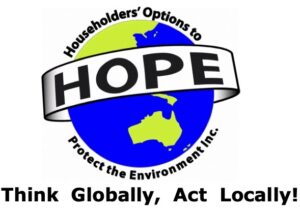Written by Anna Kula, HOPE researcher Qld
Bedrock: inspired beginnings
The World Environment Day held on Sunday 5 June 1988 celebrated the theme “When People Put Environment First, Development Will Last”, what we now have come to refer to as sustainable practice. On this day Janet MacKenzie, editor and avid environmentalist, gave an informal speech in Mansfield Victoria about how ‘ordinary people can make a difference by raising awareness and initiating actions to solve local environmental problems’.
MacKenzie’s speech inspired Householders’ Options to Protect the Environment (HOPE) with the slogan ‘Think Globally – Act Locally’, which went on to establish 80 branches across Victoria alone. MacKenzie established the organisation’s charter the “HOPE Generator” which Figure 1 Janet MacKenzie, environmentalist supplies everyday people with information, contacts, and resources to help lessen their impact on the environment. The HOPE Generator states that “… everyone can do something, no matter how small. Maybe tomorrow they’ll do more.”
Subsoil: work throughout the years
One of the first things implemented by Frank and his fellow volunteers at the HOPE Toowoomba branch was a weekly column in the Downs Star newspaper. The weekly column was published for eight years, offering helpful hints for households to reduce their environmental impact, which Frank believes “paved the way for HOPE’s acceptance in the community” and attracted regular volunteers. Later the article turned into a bi-monthly newsletter reaching more households across Queensland and was instrumental in helping form partnerships and promoting HOPE’s mission. Nowadays, HOPE releases its own monthly e-newsletter that is shared digitally with its members and partners across Australia.
In 2000, HOPE Victoria approached HOPE Toowoomba, which now had a website and recurring newsletter, to run HOPE nationwide. “We choose to run the national version of HOPE on a members and supporters bases, rather than branch-based,” explains Frank, as HOPE Victoria became fragmented and sought a more cohesive approach. However, it wasn’t until 2007 that Frank took over running HOPE on a national level, becoming President of HOPE Australia.
When asked about some of the major achievements of the last three decades Frank lists the various publications produced by HOPE. Over the years HOPE has been awarded funding to publish several information booklets, which were disseminated and made available to the public. The Ecology Audit booklet, funded by the Gambling Community Benefit Fund, was a questionnaire about sustainable living for primary school students published in 1999 with a second edition released in 2005.
HOPE published three editions of the “Householder’s guide to sustainable living: Helpful hints to reduce your carbon footprint” between 2007 and 2014. The 74-page comprehensive guide provides tips on ways to be ‘water wise’, how to create non-toxic cleaning products, ethical eating, more eco-friendly means of transport, recycling, energy, building and renovation and gardening. The “Low Carbon Living” booklet of 2014 was granted funding by the Queensland Government. Like the “Householder’s guide to sustainable living” this slightly shorter guide looks at reducing household impact in the home focusing on power, food, transport, water and waste. In 2022 “How to live sustainably and chemical-free” booklet was developed by HOPE looking at the chemicals used in our household, food and gardening as well as ways to reduce waste in our home. In 2009 HOPE has also received funding from the Queensland state government to promote energy efficiency practices in households and to start the Darling Downs Solar Neighbourhood project.
Click to read and download the document Feature article — HOPE – Three decades of environmentalism.pdf.
Frank Ondrus, President – HOPE Inc., ph. 07 4639 2135
** Looking for other media releases? Visit our Media Activities page.
